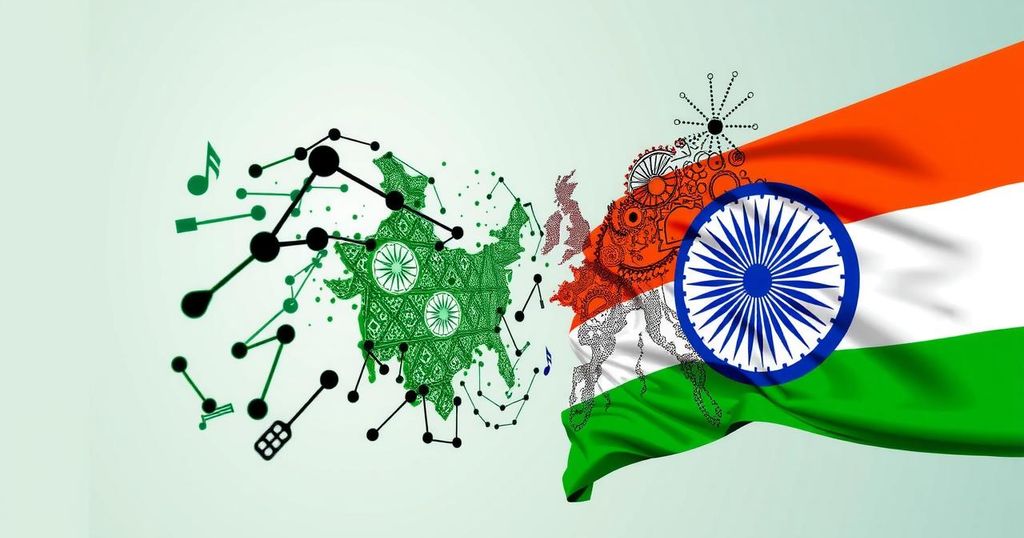Reassessing Bangladesh-India Relations Amidst Media Narratives
The article discusses the complexities in Bangladesh-India relations, emphasizing the challenges presented by the Indian media’s negative portrayal following Bangladesh’s political upheaval. It calls for a more respectful and nuanced understanding of the realities facing Bangladesh, urging for dialogue that prioritizes democratic values and cultural respect over sensationalist narratives.
The relationship between Bangladesh and India is complex, characterized by both commendable cooperation and underlying tensions, especially as they are portrayed in the Indian media. Chief Adviser Prof Muhammad Yunus underscored the depth of this relationship, emphasizing a need for mutual respect and shared prosperity despite differences. Recent coverage by various Indian outlets has deviated to harsher narratives, particularly post the political upheaval in Bangladesh, highlighting perceived threats and oppressive actions against minorities, primarily focusing on the Hindu community.
Post-regime change in Bangladesh, Indian media has often attributed the unrest to external influences, sidelining local agency and the student-led movements that initiated the protests. The reduction of the significant civilian casualties and mass demonstrations to mere incidents of violence against Hindus reflects a concerning bias. Furthermore, the absence of coverage on the brutal repression faced by demonstrators illustrates a concentrated narrative that leans towards portraying Bangladesh as hostile territory for Hindus rather than a nation facing multifaceted challenges.
The Indian media’s portrayal of Bangladesh lacks a comprehensive understanding of the socio-political dynamics at play. Reports have predominantly been characterized by sensationalist language and a focus on specific aspects, igniting fears among the Indian populace rather than fostering a nuanced dialogue. Such framing not only undermines Bangladesh’s autonomy but also fosters an Islamophobic sentiment that misinterprets the cultural heritages of its Muslim majority.
To cultivate a more constructive Bangladesh-India relationship, it is essential for both nations to frame their interactions through the lens of democracy and mutual respect, prioritizing people-to-people ties over regime-centric narratives. Open dialogues rooted in genuine understanding and recognition of cultural intricacies are imperative for overcoming historical prejudices and building a respectful partnership that acknowledges the realities of both countries.
In conclusion, a fundamental shift is required in how the Indian media perceives and portrays Bangladesh, acknowledging its sovereignty and the agency of its people rather than succumbing to preconceived notions. This shift towards respectful engagement and comprehensive understanding is vital for a sustainable and peaceful coexistence between the two neighboring nations.
The article reflects on the evolving nature of Bangladesh-India relations, especially in light of recent political changes in Bangladesh. It critiques the portrayal of these developments in the Indian media, which has taken a turn toward negative narratives after the political upheaval that ousted Sheikh Hasina. This criticism is rooted in the historical context of South Asian politics, highlighting the legacy of British colonialism’s divide-and-rule policies and the ongoing communal tensions within the region. The author argues for a more balanced, respectful approach in media coverage that focuses on democracy and the true state of bilateral relationships.
In summary, the intricate relationship between Bangladesh and India must evolve beyond media sensationalism and external influences. By fostering mutual respect and understanding, both nations can work towards a healthier, cooperative partnership that values the political autonomy of Bangladesh and recognizes its cultural identity. The necessity for an informed and respectful dialogue remains paramount in this endeavor. The shift from regime-based to people-based interactions is crucial for building lasting ties founded on shared interests and mutual growth.
Original Source: asianews.network








Post Comment